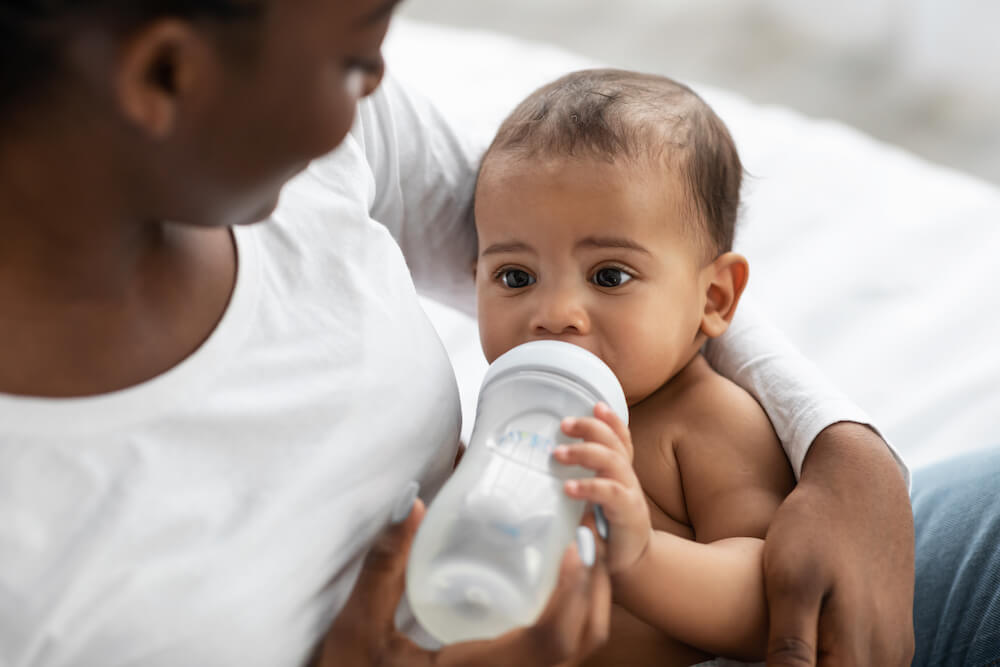When can babies hold their own bottle? Learn what skills your baby needs to self-feed and how you can encourage safe self-feeding.
When you first bring your newborn home, they need you for everything. However, before long, your little one will start developing a number of skills that allow them to become more independent.
Many of your baby’s milestones require a series of skills that develop over time. This includes things like self-feeding. The question of “when do babies start holding their own bottle?” is a perfect example of a major milestone that comes from the mastery of many different skills.
In order for your baby to properly hold their own bottle or even a sippy cup requires fine motor skills, cognitive skills, muscle strength, and coordination. Read on to discover when you can expect your baby to hold their own bottle.
When Can Babies Hold Their Own Bottle?
There is no one-size-fits-all answer to this question. Because the ability to hold a bottle on their own is based on your baby’s development, every child will reach this milestone in their own time.
As your baby grows and develops, there are some telltale signs that will let you know that your little one may be ready to start self-feeding. Some signs that your baby can hold their own bottle are:
- They can sit independently.
- They are able to stay balanced when sitting with a toy in hand.
- They can reach for objects and pick them up when sitting.
- They reach for food and bring it to their mouth.
- They put one or both hands on the bottle during feedings.
Some of the most important milestones that influence your baby’s ability to hold their own bottle are their fine motor skills and muscle strength.
Around six or seven months old, your baby’s fine motor skills will begin to include the ability to reach for things and grasp them with their whole hand. They will even begin to hold an item in each hand and move it from one place to another.
Core strength and strength in their arms and neck is an integral factor in determining when babies can hold their own bottle. Sitting independently is a major milestone that starts around 6 months old and requires strong neck and core muscles as well as head control.
You can track all your baby’s milestones and progress by downloading the Kinedu app today!
So, when do babies start holding their own bottle? The short answer is, when they are ready, but generally anytime between 6 to 10 months old is considered the normal age range for when babies start self-feeding.
How To Encourage Your Baby To Hold Their Own Bottle
The best way to help your baby begin holding their own bottle and self-feeding is to encourage and support their physical and cognitive skill development from day one. We’ve learned that the answer to “when can babies hold their own bottle” is directly related to your baby’s mastery of early milestones.
Here are some of the most impactful ways you can help your little one develop the skills needed to begin holding their own bottle:
- Tummy Time: Introducing tummy time as part of your baby’s every day schedule as soon as they get home from the hospital is one of the most important things you can do. Tummy time helps your baby build strength, gain head control, and is the foundation for milestones like crawling, sitting, walking, and of course, self-feeding.
- Support Hand-Eye Coordination: Being able to hold their bottle and successfully bring it to their mouth requires hand-eye coordination. This skill set develops over time and you can help encourage it by demonstrating hand-to-mouth motions early on. Using items like teethers and slowly bringing them from a lower position to your baby’s mouth. During feeding times you can practice this by placing your baby’s hands on the bottle and guiding it to their mouth with your hands.
- Engage in Developmental Activities: Helping your baby master and develop the ability to sit independently and hold items in their hands will give them the skills needed to self-feed. Encourage your baby to play with toys when sitting to develop the muscle strength in their arms. Play pretend with an empty bottle to practice their motor skills and hand-eye coordination.
For more ideas, be sure to download Kinedu to access more than 1,800 activities to support your baby’s development at each stage.
Safety Tips For When Babies Begin To Hold Their Own Bottle
There’s no question that when babies start holding their own bottle there is a feeling of excitement and relief. This is such an exciting part of their development and one that will definitely make feedings easier.
Once your baby is able to hold their own bottle, there are some things to remember in order to ensure that your baby is safely self-feeding. Some precautions to keep in mind when babies can hold their own bottles are:
- Never leave your baby alone when they are drinking from a bottle. Be sure to listen for healthy feeding sounds.
- Only give your baby a bottle when it is feeding time. Resist the urge to use bottles for comfort or for sleep.
- Never leave your baby in their crib with a bottle. This is not only a choking hazard but long-term results in milk collecting around their teeth and leads to tooth decay.
- Never prop a bottle up into your baby’s mouth. Not only can this cause choking and overeating, but when lying down, a propped bottle can increase your baby’s risk of ear infections.
For more help with safe self-feeding and other important baby milestones, download Kinedu to join expert-led classes about baby safety and other relevant topics for parents.







